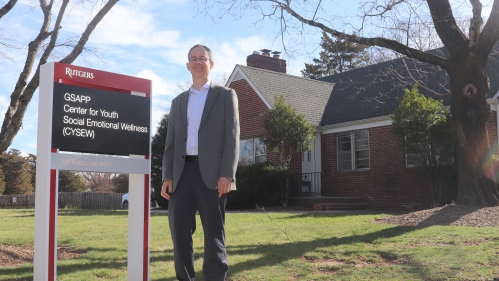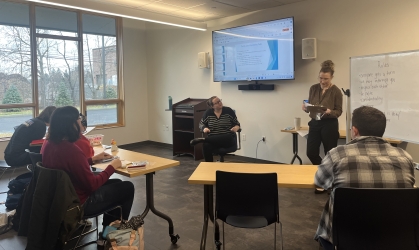ACCESS Connects with University Community to Offer Comprehensive ADHD Services to Students

While Rutgers—New Brunswick students can readily access a variety of health-related services on campus through Student Health, the Graduate School of Applied and Professional Psychology Center for Psychological Services (GSAPP-CPS), and Counseling, Alcohol and Other Drug Assistance Program & Psychiatric Services (CAPS), some still fall through the cracks. This is especially true for students who struggle with psychological conditions such as Attention Deficit and Hyperactivity Disorder (ADHD), which affects between 5-8% of the young adult population.
That’s where Accessing Campus Connections and Empowering Student Success (ACCESS), an ADHD cognitive behavioral program new to Rutgers, comes in.
Co-developed by director of the GSAPP Center for Youth Social Emotional Wellness (CYSEW), Dr. Joshua Langberg, the program is run through the Rutgers College Support Program (CSP) as a partnership between the Center for Adult Autism Services (RCAAS) and the CYSEW, two units within Rutgers University-New Brunswick’s Graduate School of Applied and Professional Psychology (GSAPP).
Following a successful pilot year, and with support from Rutgers-NB Chancellor Strategic Funds and a grant from the NJ Office of the Secretary of Higher Education (OSHE), the program is now being offered broadly to Rutgers undergraduate and graduate students with ADHD.
According to Dr. Elizabeth Chan, the ADHD Clinic director at CYSEW, the ACCESS acronym works in two dynamic ways: the program is accessible both on-campus and virtually, and the program makes academic and non-academic parts of the college experience more accessible to students with ADHD.
Dr. Chan’s observations have proven true for many students who participated in the 2023-24 pilot year of ACCESS at Rutgers.
“One of my biggest motivators for going to the ACCESS program was that I had a missed opportunity to apply for about ten internships last fall,” said Hikari Oshiro, a student in the School of Biological and Environmental Sciences. “Out of all those applications, I only submitted two, even though I could have completed them all very quickly.”
“That’s the experience that made me say, ‘I am going to figure out what to do so that this never happens again.’ And now, after ACCESS, I know that I can do things that I don’t want to do, like submit applications.”
The ACCESS program covers three main topic areas through weekly small group sessions and individual mentoring sessions: psychoeducation about ADHD to build empowerment and knowledge; behavioral skills and strategies to strengthen organization and time management; and cognitive strategies to boost self-esteem and counteract negative thought patterns commonly experienced by people with ADHD.

In tandem with the ACCESS program, CYSEW also offers low-cost ADHD diagnostic evaluations for Rutgers undergraduate and graduate students. The assessments, covered fully by Rutgers student insurance or a co-pay of $150 with other health insurance, can open doors for other services that require a report and official documentation.
For CAPS, ACCESS and the ADHD diagnostic testing offered by CYSEW has filled an important niche in the student experience.
“Having ACCESS has been a lifesaver for CAPS,” said Dr. Jennifer Jones-Damis, CAPS Director and a GSAPP alum. “CYSEW has made it possible for students to receive competent ADHD and mental health evaluations and to then receive treatment with ACCESS, which connects students to CAPS,” she said.
Sabrina Starkman, a behavioral health consultant in the Student Centers who referred two students to ACCESS, stressed the positive impact she had seen on her referrals. “At CAPS, we work with a lot of students who struggle with executive functioning due to ADHD and other behavioral health concerns,” Starkman said. “Partnering with campus resources like ACCESS helps provide better wrap-around services that improve students’ overall well-being and holistic experience at Rutgers.”
The ACCESS program runs for eight weeks throughout the fall and spring semesters of the academic year. Students meet in group sessions with other peers and with individual mentors for 1-on-1 consultations. Throughout the program, students are continually asked to reflect on how they can apply what they are learning into all aspects of their academic, professional, and personal lives.
“When I first came into Rutgers, I wasn't able to complete my assignments on time,” said Aakef Khan, a junior in the Mason Gross School of the Arts. “During my third semester here, I had some negative experiences which led me to fail all my classes, and I was put on academic probation.”
Khan reached out to CAPS, who then referred him to the ACCESS program, where he was offered the resources that he needed.
“ACCESS gave me the tools that I needed to pull myself out of the difficult situation that I was in at Rutgers,” said Khan, who has found more academic success and is looking for opportunities to get more involved in campus life in the fall semester. “With their assistance, I was able to navigate unique barriers that I faced and put myself into a better situation.”
Omar Kawam, a graduate student at Robert Wood Johnson Medical School (RWJMS) and co-chair of the Substance Use Interest Group, found the most value in the group sessions held as part of ACCESS.
“My favorite part of the experience was connecting with other people and hearing their experiences and their struggles,” said Kawam. “Sometimes we try different things; sometimes they work and sometimes they don’t, but that was the most valuable part of the program for me.”
Moving forward, beyond increasing participation in ACCESS, RCAAS and CYSEW envision making ADHD resources a more central part of the Rutgers community.
“In the future, I would love for ACCESS to be available as a course,” said Langberg. “I want ACCESS to lead students to feel empowered to manage their own mental health and academic support needs, to gain a sense of belonging on campus, and to increases rates of retention and on-time graduation.”
To that end, Langberg and his team recently trained over 20 Rutgers clinicians from CAPS, the Learning Centers, and Rutgers Health on ACCESS implementation, with the goal of collaborating to scale-up and make ACCESS available more widely. As one example, the program is expanding to serve students with mild traumatic brain injuries (mTBI).
As the program expands, ACCESS will continue doing what it has started: serving students with ADHD and ADHD-related challenges.
“It is a really amazing program,” said Angely Morocho, a senior in the School of Environmental and Biological Sciences who took part in the ACCESS program last year.
“It’s filled with incredible, intelligent people who will validate you and fast-track you into understanding your ADHD, managing it, and keeping yourself accountable to it. And if that’s what you’re looking for, this program is for you.”
For more on RCAAS, you can click here to read our article on their partnership with Dining. For more on the launch of ACCESS, you can click here to read an article from Rutgers Today. If you would like to apply to the ACCESS program, you can click here to find their application form. For more information on ACCESS, you can click here.
